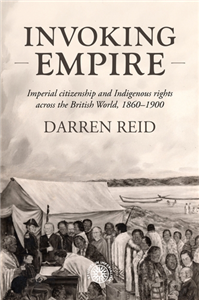Invoking Empire
Imperial citizenship and Indigenous rights across the British World, 1860–1900
by Darren Reid
Description
More Information
Rights Information
Albania, Algeria, Angola, Argentina, Armenia, Australia, Austria, Bahrain, Belgium, Belize, Benin, Bolivia, Bosnia and Herzegovina, Botswana, Brazil, Bulgaria, Burkina Faso, Burundi, Cameroon, Canada, Cape Verde, Central African Republic, Chad, Chile, China, Colombia, Comoros, Congo [DRC], Congo, Republic of the, Costa Rica, Ivory Coast, Croatia, Czech Republic, Denmark, Djibouti, Ecuador, Egypt, El Salvador, Equatorial Guinea, Eritrea, Estonia, Ethiopia, Faroe Islands, Finland, France, French Guiana, Gabon, Gambia, Georgia, Germany, Ghana, Greece, Guatemala, Guinea, Guinea-Bissau, Guyana, Honduras, Hongkong, Hungary, Iceland, India, Indonesia, Iran, Iraq, Ireland, Israel, Italy, Japan, Jordan, Kazakhstan, Kenya, Kuwait, Latvia, Lebanon, Lesotho, Liberia, Libya, Lithuania, Luxembourg, Macau, China, Macedonia [FYROM], Madagascar, Malawi, Malaysia, Mali, Malta, Mauritania, Mauritius, Mayotte, Mexico, Mongolia, Montenegro, Morocco, Mozambique, Namibia, Netherlands, New Zealand, Nicaragua, Niger, Nigeria, Norway, Oman, Pakistan, Panama, Paraguay, Peru, Philippines, Poland, Portugal, Puerto Rico, Qatar, Reunion, Romania, Russia, Rwanda, Saint Helena, Sao Tome and Principe, Saudi Arabia, Senegal, Serbia, Seychelles, Sierra Leone, Singapore, Slovakia, Slovenia, Somalia, South Africa, South Korea, Spain, Sri Lanka, Sudan, Suriname, Swaziland, Sweden, Switzerland, Syria, Taiwan, Tanzania, Thailand, Timor-Leste, Togo, Tokelau, Tunisia, Turkey, Uganda, Ukraine, United Arab Emirates, United Kingdom, United States, Uruguay, Venezuela, Vietnam, Western Sahara, Yemen, Zambia, Zimbabwe, South Sudan, Cyprus, Palestine, Bangladesh, Cambodia, Liechtenstein, Azerbaijan, Jamaica, Kyrgyzstan, Dominican Republic, Myanmar, Monaco
Reviews
Invoking Empire analyses local perceptions and impacts of imperial governance in Britain's settler colonies to explore the entanglement of imperialism and settler colonialism in the late nineteenth century. The book brings together nine case studies from settler and Indigenous communities across Canada, Australia, New Zealand, and South Africa to demonstrate the multiplicity of ways colonial subjects leveraged imperial authority in their everyday lives. Asking how and why colonial inhabitants attempted to co-opt imperial authority in diverse contexts ranging from an 1868 smallpox outbreak in British Columbia to the Bechuanaland Wars of 1882-85, Invoking Empire provides valuable microhistorical and comparative insights into the lived experiences of imperial political subjecthood during the transition to self-government in the settler colonies. Moreover, by critically assessing the failures of imperial citizenship to achieve tangible results, the book offers crucial insights into the complicity of British governments and publics in settler colonialism. Adopting an integrative approach that brings Indigenous and settler experiences together, Invoking Empire contributes a novel approach to imperial citizenship that captures the diverse cultural and political connotations of imperial connectivity. Additionally, the book's approach to settler colonialism as deeply entangled in imperial continuities contributes to ongoing efforts to reconceptualize national settler histories through a transnational lens. Through its deliberate attention to the complexity and indeterminacy of the late nineteenth century, Invoking Empire provides an essential window into to the messiness, the hopefulness, and the often times paradoxical nature of imperial subjecthood during a period of massive and consequential political changes.
Author Biography
Darren Reid is a Postdoctoral Fellow in History at McGill University
Manchester University Press
Manchester University Press is a leading UK publisher known for excellent research in the humanities and social sciences.
View all titlesBibliographic Information
- Publisher Manchester University Press
- Publication Date August 2025
- Orginal LanguageEnglish
- ISBN/Identifier 9781526181626 / 1526181622
- Publication Country or regionUnited Kingdom
- FormatPrint PDF
- Pages232
- ReadershipGeneral/trade; College/higher education; Professional and scholarly
- Publish StatusPublished
- Dimensions234 X 156 mm
- Biblio NotesDerived from Proprietary 6260
- SeriesStudies in Imperialism
- Reference Code16724





